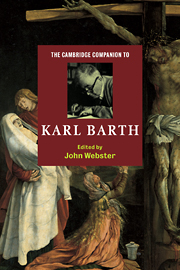Book contents
- Frontmatter
- 1 Introducing Barth
- 2 Theology
- 3 Revelation
- 4 The Bible
- 5 The Trinity
- 6 Grace and being
- 7 Creation and providence
- 8 Karl Barth’s Christology
- 9 Salvation
- 10 The humanity of the human person in Karl Barth’s anthropology
- 11 The mediator of communion
- 12 Christian community, baptism, and Lord’s Supper
- 13 Barth’s trinitarian ethic
- 14 Karl Barth and politics
- 15 Religion and the religions
- 16 Barth and feminism
- 17 Barth, modernity, and postmodernity
- 18 Karl Barth
- Index
6 - Grace and being
the role of God’s gracious election in Karl Barth’s theological ontology
Published online by Cambridge University Press: 28 May 2006
- Frontmatter
- 1 Introducing Barth
- 2 Theology
- 3 Revelation
- 4 The Bible
- 5 The Trinity
- 6 Grace and being
- 7 Creation and providence
- 8 Karl Barth’s Christology
- 9 Salvation
- 10 The humanity of the human person in Karl Barth’s anthropology
- 11 The mediator of communion
- 12 Christian community, baptism, and Lord’s Supper
- 13 Barth’s trinitarian ethic
- 14 Karl Barth and politics
- 15 Religion and the religions
- 16 Barth and feminism
- 17 Barth, modernity, and postmodernity
- 18 Karl Barth
- Index
Summary
INTRODUCTION: ON THE CHRISTOCENTRICITY OF BARTH’S DOCTRINE OF ELECTION
When the history of theology in the twentieth century is written from the vantage point of, let us say, one hundred years from now, I am confident that the greatest contribution of Karl Barth to the development of church doctrine will be located in his doctrine of election. It was here that he provided his most valuable corrective to classical teaching; here too his dogmatics found both its ontic ground and its capstone. Nothing in that claim will seem surprising to those who are acquainted with Barth's teaching on this theme. But a more penetrating analysis will also, I think, yield the observation that it was in Barth's doctrine of election that the historicizing tendencies of well over a century of theology prior to him found, at one and the same time, both their relative justification and their proper limit. What Barth accomplished with his doctrine of election was to establish a hermeneutical rule which would allow the church to speak authoritatively about what God was doing - and, indeed, who and what God was/is - 'before the foundation of the world', without engaging in speculation.
- Type
- Chapter
- Information
- The Cambridge Companion to Karl Barth , pp. 92 - 110Publisher: Cambridge University PressPrint publication year: 2000
- 17
- Cited by

